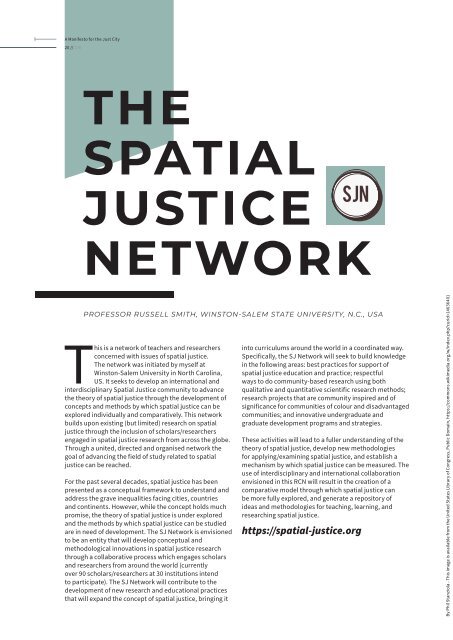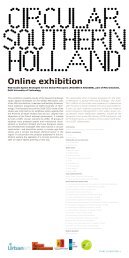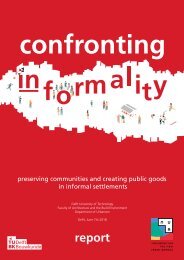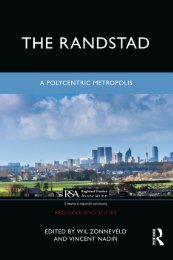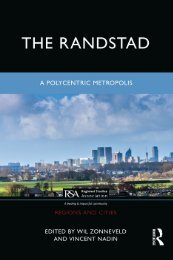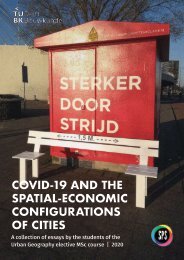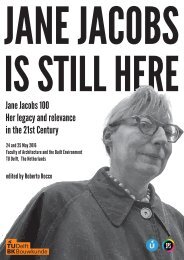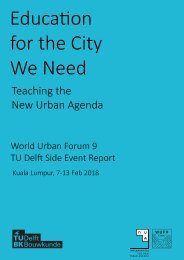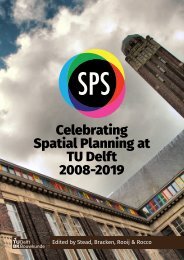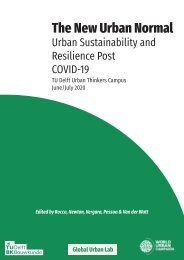A Manifesto for the Just City
On Monday 29 MARCH at 18:00 (CET/Amsterdam), TU Delft launched the Book "A Manifesto for the Just City", with texts by a number of guests and 43 manifestos written by students from 25 universities from all over the world. A “Manifesto for the Just City” comes in the wake of the realisation that socio-spatial justice is a crucial dimension for sustainability transitions. Growing inequality and the erosion of the public sphere undermine the social and political structures required to fight climate change, pandemics and other systemic shocks. With this book, we have sought to encourage students to formulate their own visions for the Just City and for a just transition. This book is result of an Urban Thinkers Campus organised between 9 and 30 November 2020. The Urban Thinkers Campus (UTC) model is an initiative of UN-Habitat’s World Urban Campaign, conceived in 2014 as an open space for critical exchange between stakeholders and partners. It aims to promote debate and action on sustainable and inclusive urbanization upholding the principles and guidelines contained in the New Urban Agenda, launched at Habitat-III in 2016 in Quito, Ecuador.
On Monday 29 MARCH at 18:00 (CET/Amsterdam), TU Delft launched the Book "A Manifesto for the Just City", with texts by a number of guests and 43 manifestos written by students from 25 universities from all over the world.
A “Manifesto for the Just City” comes in the wake of the realisation that socio-spatial justice is a crucial dimension for sustainability transitions. Growing inequality and the erosion of the public sphere undermine the social and political structures required to fight climate change, pandemics and other systemic shocks. With this book, we have sought to encourage students to formulate their own visions for the Just City and for a just transition.
This book is result of an Urban Thinkers Campus organised between 9 and 30 November 2020. The Urban Thinkers Campus (UTC) model is an initiative of UN-Habitat’s World Urban Campaign, conceived in 2014 as an open space for critical exchange between stakeholders and partners. It aims to promote debate and action on sustainable and inclusive urbanization upholding the principles and guidelines contained in the New Urban Agenda, launched at Habitat-III in 2016 in Quito, Ecuador.
You also want an ePaper? Increase the reach of your titles
YUMPU automatically turns print PDFs into web optimized ePapers that Google loves.
A <strong>Manifesto</strong> <strong>for</strong> <strong>the</strong> <strong>Just</strong> <strong>City</strong><br />
20 // 276<br />
THE<br />
SPATIAL<br />
JUSTICE<br />
SJN<br />
NETWORK<br />
PROFESSOR RUSSELL SMITH, WINSTON-SALEM STATE UNIVERSITY, N.C., USA<br />
This is a network of teachers and researchers<br />
concerned with issues of spatial justice.<br />
The network was initiated by myself at<br />
Winston-Salem University in North Carolina,<br />
US. It seeks to develop an international and<br />
interdisciplinary Spatial <strong>Just</strong>ice community to advance<br />
<strong>the</strong> <strong>the</strong>ory of spatial justice through <strong>the</strong> development of<br />
concepts and methods by which spatial justice can be<br />
explored individually and comparatively. This network<br />
builds upon existing (but limited) research on spatial<br />
justice through <strong>the</strong> inclusion of scholars/researchers<br />
engaged in spatial justice research from across <strong>the</strong> globe.<br />
Through a united, directed and organised network <strong>the</strong><br />
goal of advancing <strong>the</strong> field of study related to spatial<br />
justice can be reached.<br />
For <strong>the</strong> past several decades, spatial justice has been<br />
presented as a conceptual framework to understand and<br />
address <strong>the</strong> grave inequalities facing cities, countries<br />
and continents. However, while <strong>the</strong> concept holds much<br />
promise, <strong>the</strong> <strong>the</strong>ory of spatial justice is under explored<br />
and <strong>the</strong> methods by which spatial justice can be studied<br />
are in need of development. The SJ Network is envisioned<br />
to be an entity that will develop conceptual and<br />
methodological innovations in spatial justice research<br />
through a collaborative process which engages scholars<br />
and researchers from around <strong>the</strong> world (currently<br />
over 90 scholars/researchers at 30 institutions intend<br />
to participate). The SJ Network will contribute to <strong>the</strong><br />
development of new research and educational practices<br />
that will expand <strong>the</strong> concept of spatial justice, bringing it<br />
into curriculums around <strong>the</strong> world in a coordinated way.<br />
Specifically, <strong>the</strong> SJ Network will seek to build knowledge<br />
in <strong>the</strong> following areas: best practices <strong>for</strong> support of<br />
spatial justice education and practice; respectful<br />
ways to do community-based research using both<br />
qualitative and quantitative scientific research methods;<br />
research projects that are community inspired and of<br />
significance <strong>for</strong> communities of colour and disadvantaged<br />
communities; and innovative undergraduate and<br />
graduate development programs and strategies.<br />
These activities will lead to a fuller understanding of <strong>the</strong><br />
<strong>the</strong>ory of spatial justice, develop new methodologies<br />
<strong>for</strong> applying/examining spatial justice, and establish a<br />
mechanism by which spatial justice can be measured. The<br />
use of interdisciplinary and international collaboration<br />
envisioned in this RCN will result in <strong>the</strong> creation of a<br />
comparative model through which spatial justice can<br />
be more fully explored, and generate a repository of<br />
ideas and methodologies <strong>for</strong> teaching, learning, and<br />
researching spatial justice.<br />
https://spatial-justice.org<br />
By Phil Stanziola - This image is available from <strong>the</strong> United States Library of Congress, Public Domain, https://commons.wikimedia.org/w/index.php?curid=14636401


